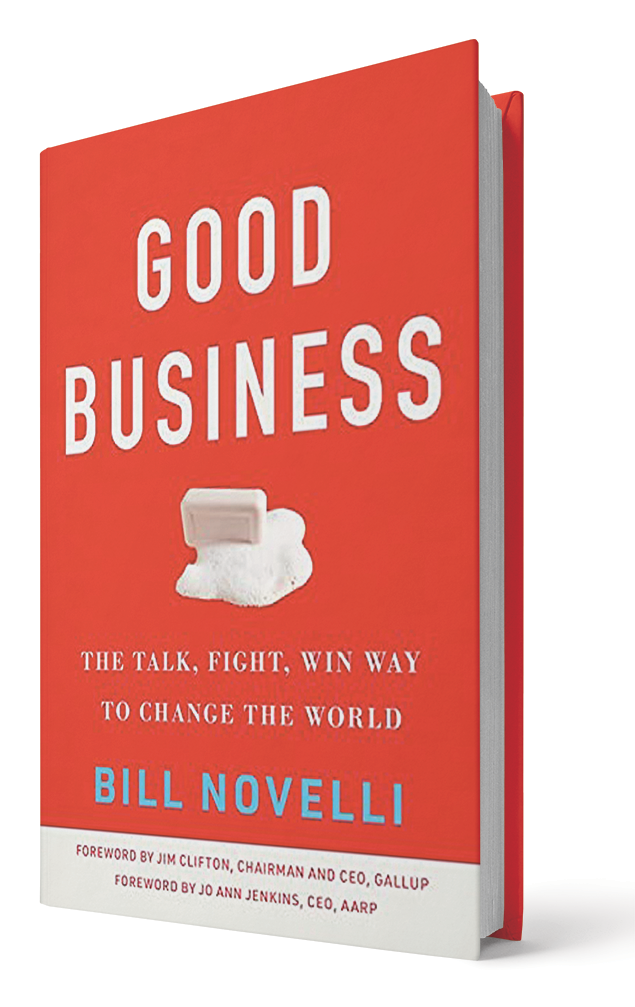Changing one small word in a familiar statement shows the increased importance of corporate social responsibility (CSR), says a pioneer in the field.
We’ve all heard “Doing well while doing good.” But Bill Novelli asserts that “doing well by doing good” is more accurate in today’s business environment.
The use of the word by “means the company can improve its bottom line — shareholder value — as a consequence of creating positive results for other stakeholders and society,” Novelli said, adding that HR professionals play a critical role in achieving that goal.
In other words, helping society isn’t a nice frill that’s unrelated to the bottom line. It’s an essential part of the success formula.
Novelli, 80, has played a variety of visionary roles in the “evolution” of corporate social responsibility movement for more than half a century. (See “Good Business: The Talk, Fight, Win Way to Change the World.”)
While we’re talking lexicon, the names for CSR, like the movement itself, have changed over the years. Novelli pointed out that several allies think CSR is dated, preferring terms such as the triple bottom line — people, planet, profit. Other concepts that fall under the CSR umbrella include sustainability, ESG (environment, social, governance), DEI (diversity, equity and inclusion), corporate philanthropy and shared values.
In the last 50-plus years, Novelli’s seen a lot of ballyhooed CSR movements, such as an emphasis on business ethics after the Charles Keating-led savings and loan scandals of the late 1980s, quickly dissipate. No matter what it’s called, what makes today’s movement different from its flash-in- the-pan predecessors?
“There are several reasons, but two big ones,” said Novelli, who co-founded and is a professor of practice in Georgetown University’s McDonough School of Business’s Business for Impact Center.
“First, capitalism isn’t working so well. You have groups like the Business Roundtable saying we have to reposition the role of business in America,” Novelli said.
That 2019 Business Roundtable landmark “Statement on the Purpose of a Corporation” was signed by 181 CEOs who committed to lead their companies for the benefit of all stakeholders.
“The American dream is alive, but fraying,” said Jamie Dimon, chairman and CEO of JPMorgan Chase & Co. and Business Roundtable chairman, in that announcement. “Major employers are investing in their workers and communities because they know it is the only way to be successful over the long term. These modernized principles reflect the business community’s unwavering commitment to continue to push for an economy that serves all Americans.”
“Major employers are investing in their workers and communities because they know it is the only way to be successful over the long term. These modernized principles reflect the business community’s unwavering commitment to continue to push for an economy that serves all Americans.”
Novelli continued, “Secondly, especially younger generations, my MBA students — Millennials and Generation Z — say it’s not enough to stay with one company your whole career. They want purpose as well as a paycheck. If companies want to compete successfully, they have to figure that out.”
Countless surveys support this notion, including one by Appcast, a programmatic recruitment advertising technology and service provider, where 51% of U.S. respondents said they would exclude a company from their job search if its values and stance on diversity and inclusion didn’t match their own beliefs. That percentage was higher among respondents 30 years and younger (56%), providing an inside look at how younger generations will shape the future of work.
“My students all want to be part of the CSR team when they join a company,” Novelli said. “That’s hard to do, but I remind them that anyone in any position in a company can make a difference.”
Including, of course, HR professionals. Novelli insisted he is not trying to ingratiate himself to HR when he describes its role in successful, socially responsible organizations.
“I have huge respect for HR professionals,” he said. “Every day, your asset base walks out the door. There is nothing more important than human capital.”
So, what’s an HR professional to do if the organization’s senior leaders are stuck in the Milton Friedman “The business of business is business” mindset? “I would tell the C-suite people I am in charge of bringing talented people into this company,” he said. “It’s expensive to recruit and retain people. If we are to succeed and get the right talent, we have to get with this trend.”
He points to CVS, which totally repositioned itself into CVS Health Services after it quit selling cigarettes in 2014 (a decision that cost the company $2 billion in annual review). That new positioning as a health-care company, including buying insurer Aetna, has been a powerful recruitment tool, according to Eileen Howard Boone, the company’s senior vice president of corporate social responsibility and philosophy, who has joked that she’s CVS’s best recruiter.
“Remember there is a business case to be made,” Novelli emphasized. “This isn’t about altruism or going to heaven. [It’s] about succeeding in today’s and tomorrow’s business environment.”
While the movement is at its peak, it still faces hurdles — such as divisiveness in the nation.
“We are deeply at odds and the American Dream and our democracy are at risk,” Novelli wrote in the “Crossing the Aisle” op-ed essay days after the Jan. 6 U.S. Capitol insurrection. “The large majority of Americans are in the middle, not on the extremes. But no matter where people are, we need to talk and need to listen.”
Those conversations need to happen in the workplace, too, Novelli said, adding that research has shown civility in the workplace improves performance. And you can’t forget the business basics in an altruistic pursuit, he warns.
“A pharmaceutical company executive spoke to my MBA class and described their operations distributing drugs in Africa,” Novelli said. “One of my students told him afterward that she wanted to join his company and change the world. He replied, ‘I don’t need people to change the world. I need people who know supply chains.’”
‘Good Business: The Talk, Fight, Win Way to Change the World’
A television program credited with helping educate generations of American children also provided an epiphany for Bill Novelli.
Novelli was climbing the Madison Avenue ladder in the early 1970s, working on marketing campaigns for products such as cat and dog food, kids’ cereals and laundry detergent before being given the account for the fledgling Public Broadcasting System.
“I went to a press conference for this new program, Sesame Street, which they said was going to revolutionize children’s television,” Novelli recalled. “I was fascinated by [Sesame Street creator] Joan Ganz Cooney’s approach to learning. It was a light- bulb moment for me. The thought struck me that marketing practices could be applied to ideas, issues and causes just as effectively as the products I was promoting.
“It all evolved from there.”

Novelli compellingly recounts that evolution in his book, Good Business: The Talk, Fight, Win Way to Change the World (Johns Hopkins University Press, $27.95).
The book covers his more-than-50-year career, which has included co-founding one of the first social-marketing agencies, repositioning and revitalizing the Peace Corps, starting and overseeing the Business for Impact Center at Georgetown University’s McDonough School of Business, and heading the AARP for eight years.
(Looking back at his years at the helm of AARP, Novelli proudly recalls one round of Medicare negotiations during which he was called a Republican by Nancy Pelosi and a Democrat by Mitch McConnell. He also jokingly remembers protesters urging Congress to “Keep the Government Out of My Medicare.”)
“Bill Novelli has packed his life mission into each job he has had,” wrote Gallup CEO Jim Clifton in a foreword to Good Business. “He has always wanted a job that matters — and a life that matters. He was ahead of his time.”
Novelli, an engaging storyteller, also writes about folks he’s met along the way who decided (often through his inspiration and urging) to follow a career path that puts social needs before personal profit and advancement. Those examples include a Montana native who passed up big law firm offers to put her Yale degree to work promoting rural economic development and an up-and-coming college football coach who decided he could make a bigger difference teaching yoga to prison inmates.
Some of the most successful people in social impact have been involved in three sectors — private, public and civil society (nonprofits), Novelli points out.
“There’s a lot of progress to be proud of, but the problems are colossal and they call for aggressive action across organizations and sectors,” Novelli wrote in the book’s closing chapter, “What Do We Owe Our Grandchildren?” “We can build a better, stronger country for ourselves and for future generations and do well at the same time.”








